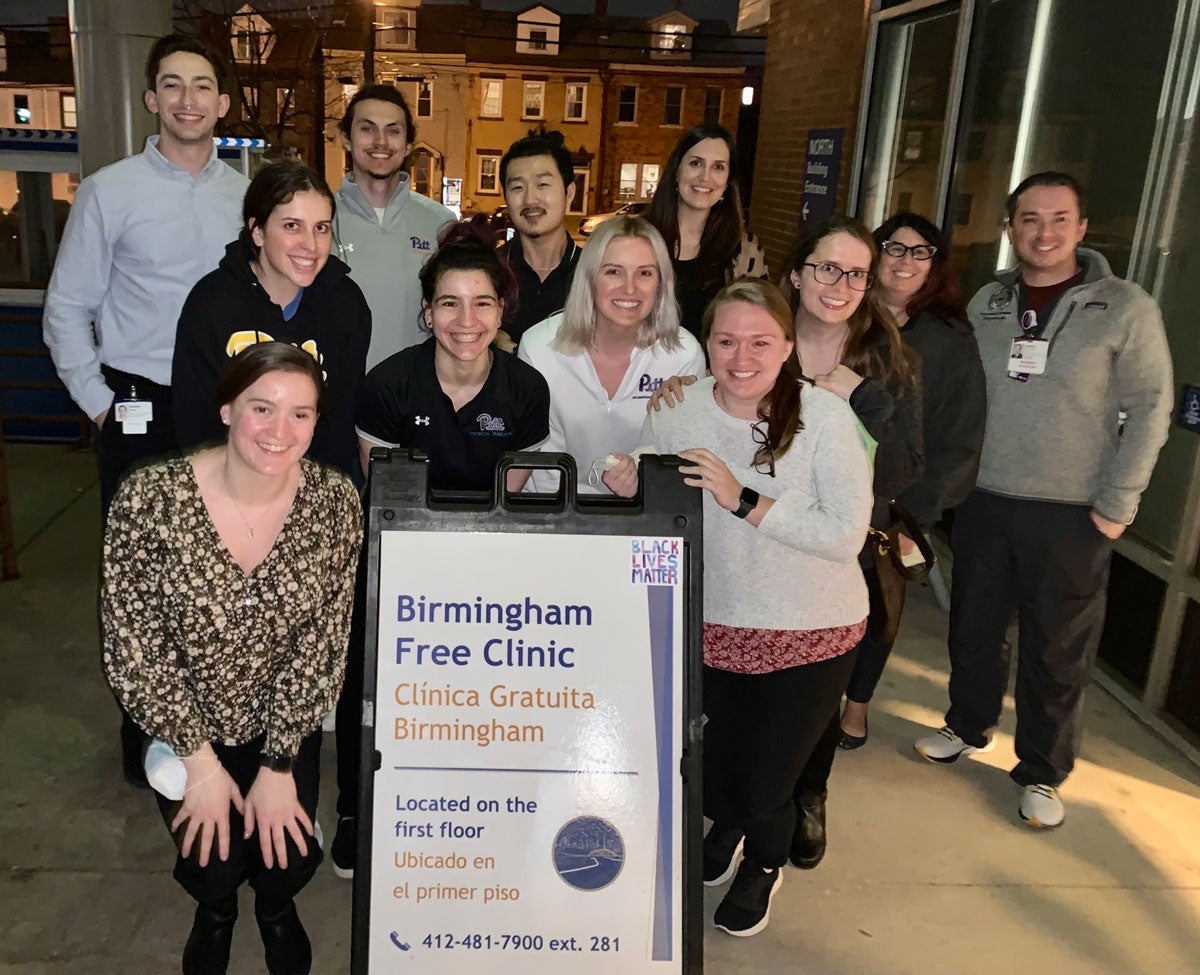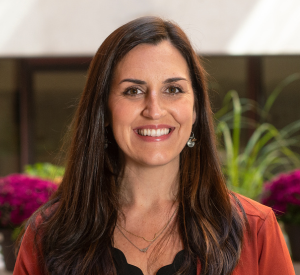The 2024–2025 SHRS Interprofessional Education Seed Award, granted to Pitt Department of Physical Therapy Assistant Professor and Director of Community Engagement Bonnie Virag (DPT ‘16) and Birmingham Free Clinic Lead Occupational Therapist Sarah McKendry (OTD ‘22), has continued to power a collaborative and community-focused initiative at Birmingham Free Clinic (BFC), bringing together students and faculty across health disciplines to provide free, patient-centered care to Pittsburgh’s community members. In September, Virag and McKendry will be presenting their project at the Nexus Summit 2025, hosted by the National Center for Interprofessional Practice and Education. This is a special opportunity for them to showcase their work on a national stage dedicated to advancing interprofessional collaboration and health care.
An Interprofessional Atmosphere
Each month, an interprofessional team including students and faculty from the University of Pittsburgh Doctor of Physical Therapy (DPT) and Doctor of Occupational Therapy (OTD) programs, students from the School of Medicine, UPMC Physical Medicine and Rehabilitation (PM&R) attending and resident physicians, community health workers, nurses, pharmacists, medical assistants, medical interpreters and AmeriCorps volunteers, work together to care for patients with complex needs. The seed award supports a key focus of the clinic: timely acquisition of durable medical equipment and clinical tools or health care services that best support patient care. This project’s work also maintained a strong emphasis on whole-person care, addressing both rehabilitation-related needs and crucial health-related social needs of patients.
Virag elaborates, “Some of the most powerful learning happens before the patients even arrive. In our pre-clinic huddles, students, clinicians and staff come together to plan how we’ll work as a team to support each patient medically, functionally and beyond. It’s where roles are clarified, interprofessional collaboration begins and we start seeing the patient as a whole person, not just a diagnosis.”
Study Results
As part of the SHRS Interprofessional Education Seed Award, we initially collected data to demonstrate the value of this interprofessional student learning experience at Birmingham Free Clinic. Project findings will be disseminated through a professional presentation at the Nexus Summit this September.
Student learning was evaluated using the Interprofessional Collaborative Competency Attainment Scale (ICCAS). Pre/post data demonstrated improvements in students’ perceived skills. Students reported gains in communication (up to +1.21), collaboration (+1.23), conflict management (+1.29), and team functioning (+1.21), suggesting the clinic meaningfully enhanced their confidence and ability to work effectively in team-based, community-centered care settings. While baseline scores varied across participants, all groups showed growth, with the most substantial improvements occurring in areas where initial self-ratings were lower.
Collaboration and Conflict Management saw the largest increases, indicating these domains may have been particularly influenced by the clinic experience. In contrast, Roles and Responsibilities and Team Functioning showed smaller changes (e.g., +0.47 and +0.44 in some groups), possibly reflecting higher baseline confidence in these areas. These outcomes support the continued value of this experience in preparing students for real-world practice as collaborative, community-centered professionals.

Seed Award Provides Essential Resources
Through the support of this award, the clinic purchased items that directly enhanced patient care, including a splint for a patient with chronic upper extremity spasticity, mobility aids such as wheeled walkers and canes and therapeutic exercise equipment to support home exercise programs. Providing these essential resources facilitated patient progress beyond clinic walls while giving students the opportunity to address health-related social needs such as transportation barriers, economic instability and limited access to care during real-world clinical decision-making.
Sara Fleck (DPT ‘25), Birmingham Free Clinic physical therapy student director, shares, “The clinic was a great learning experience. Patients were able to have multiple concerns addressed in the same visit. In one instance, a patient opted to receive an injection from the physician for trigger finger and perform a follow-up with occupational therapy while also being evaluated for plantar fasciitis by physical therapy and performing therapeutic exercise to address that issue. What I also thought was great was the shared decision-making process that took place in the room between the different disciplines and the patient. Everyone knew everything that was going on.”
Assessing Patient Feedback
An important development during the second half of this seed award’s implementation was the formal assessment of patient feedback. To ensure this clinic continues to evolve in response to the needs of community members, a survey was introduced to elevate patient voices. The survey captured patients’ perceptions of care quality, the clinic’s impact on their mobility and overall health and the value they place on having access to these services. Importantly, formal patient feedback not only informs clinic improvements and guides meaningful future changes to the clinic, but also deepens student learning by connecting their care to real community impact and patient perspectives.
This exemplifies the value of university-community partnerships rooted in access and collaboration. Students gain hands-on, interprofessional experience in a real-world setting while also learning to respect and center community voices. In return, the community benefits from comprehensive, compassionate and informed care delivered by engaged and collaborative teams. McKendry reflects, “Working with the team and the community shows everyone involved how much we can learn from each other when we show up, listen and figure it out together.”
A Sustainable Community Model
This project, supported by the SHRS Center for Interprofessional Education Studies Seed Award, has facilitated a sustainable and adaptive clinic model where an interprofessional team of students, faculty, clinicians, volunteers and community members can thrive together. Moving forward, this clinic will continue to offer services monthly. Students and clinicians will continue exploring ways to deepen interprofessional collaboration, ensuring services remain aligned with the needs of Pittsburgh’s community members who face barriers to care.
Acknowledgements
We would like to extend our sincere appreciation to Mary Herbert, practice manager and clinical director; Betsy Schwartz, lead nurse; Viadalis Ortiz-Ortiz, access lead; Olivia Carey, senior medical assistant; and all Birmingham Free Clinic staff and volunteers.
We also thank the many University of Pittsburgh physical therapy, occupational therapy, and interprofessional faculty and students involved in this clinic, as well as UPMC PM&R faculty, attending physicians, residents and students for their vital support.
We gratefully acknowledge the University of Pittsburgh SHRS Center for Interprofessional Studies for the Interprofessional Education Seed Award that powered this project. This initiative would not have been possible without the dedication and collaboration of everyone involved, and we are appreciative of their support in enriching student learning and community care.

